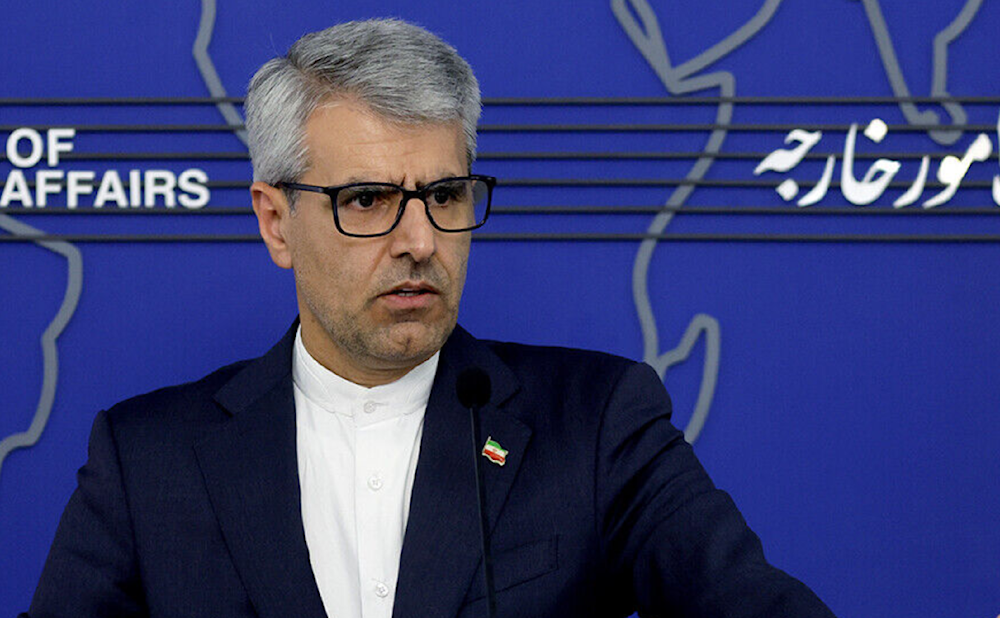Iran rejects E3 accusations against country’s peaceful nuclear program
In a joint letter sent to Guterres on December 6, the E3 claimed that Iran had significantly escalated its nuclear activities in violation of the JCPOA and UN Security Council Resolution 2231.
-

Iranian Foreign Minister Esmail Baghaei discussing European claims about Iran's nuclear program on December 10, 2024. (IRNA)
Iran's Foreign Ministry Spokesman, Esmaeil Baghaei, has refuted allegations made in a joint statement by France, Germany, and the United Kingdom regarding recent advancements in Iran's peaceful nuclear program.
The decision to operate several sophisticated centrifuges at an Iranian nuclear plant was made within the context of the rights of the Non-Proliferation Treaty (NPT) parties, with prior knowledge, and under the supervision of the International Atomic Energy Agency (IAEA); as Baghaei remarked on Tuesday night in response to a statement from the three European countries known as the E3 or Troika.
As a responsible IAEA member, the spokesperson highlighted that Iran has demonstrated its commitment to cooperation with the agency, as evidenced by agreements signed during the IAEA director general's visit to Tehran last month.
He called it regrettable that the three nations, despite the achievements of Rafael Grossi's visit, which could have served as a foundation for future cooperation, maintained their unconstructive approach and passed an anti-Iran resolution at the IAEA Board of Governors meeting.
According to Baghaei, the present difficulty with JCPOA implementation originates not from Iran's nuclear activities, but rather from the United States' unilateral departure and the inability of the three European signatories to perform their duties.
He emphasized that, notwithstanding recent meetings in Geneva, Iran remains committed to constructive engagement based on mutual respect while responding properly to any unlawful or hostile activities. Baghaei encouraged European nations to address the underlying cause of the situation—ongoing noncompliance and sanctions—rather than making inflammatory remarks about Iran's peaceful nuclear program.
Iran rejects E3 allegations of JCPOA non-compliance
Iran's ambassador to the United Nations Saeed Iravani has strongly rejected accusations by France, the UK, and Germany (the E3) that Tehran is failing to comply with its commitments under the 2015 nuclear deal, formally known as the Joint Comprehensive Plan of Action (JCPOA).
In a letter to UN Secretary-General Antonio Guterres and Security Council President Linda Thomas-Greenfield, Iravani slammed the E3 for breaching their own obligations under the agreement and urged a renewed focus on mutual diplomacy.
What were the E3's allegations?
In a joint letter sent to Guterres on December 6, the E3 claimed that Iran had significantly escalated its nuclear activities in violation of the JCPOA and UN Security Council Resolution 2231.
They cited Iran's enrichment of uranium to 60% purity, the expansion of enrichment activities at facilities like Fordow, and reduced cooperation with the International Atomic Energy Agency (IAEA), asserting that these actions posed serious proliferation risks and lacked a credible civilian purpose despite the absence of concrete evidence to support their claims.
Iran defends its actions
In his letter dated December 9, Iravani described the E3's claims as "baseless" and argued that their stance ignores Iran's sustained efforts to uphold the agreement, despite the US' withdrawal in 2018 and the imposition of severe sanctions.
"The Islamic Republic of Iran categorically rejects the claims in the E3 letter regarding Iran's alleged non-compliance with its commitments under the JCPOA," Iravani wrote.
"Any allegation regarding Iran's implementation of its JCPOA commitments is fundamentally flawed when divorced from the full context of the US withdrawal. Such a claim ignores Iran's sustained efforts to uphold the deal despite persistent provocations and violations by the US and E3/EU."

 4 Min Read
4 Min Read








